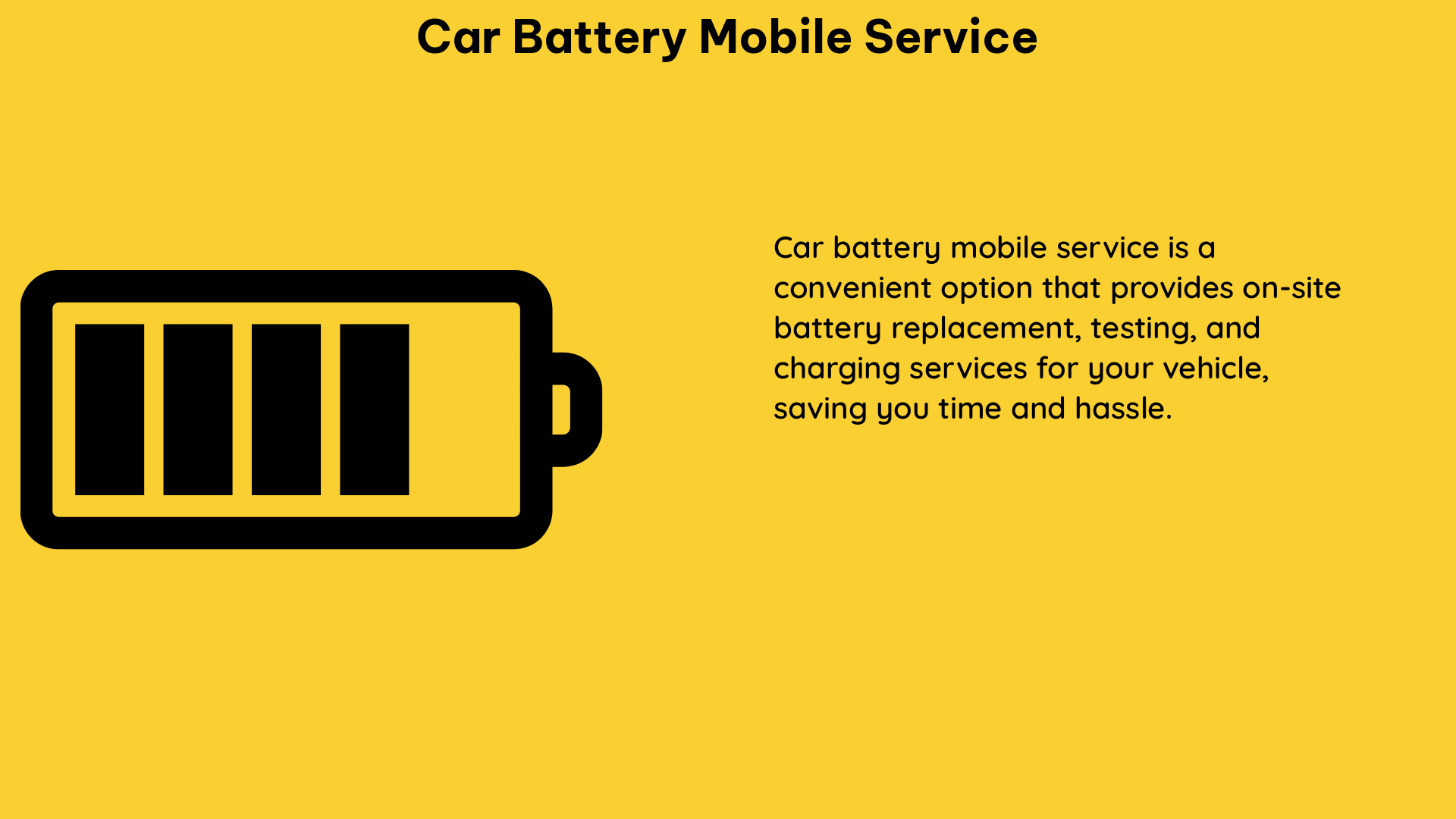Car battery mobile service is a convenient solution for drivers who need a quick and hassle-free battery replacement. Whether your car battery has died unexpectedly or it’s time for a scheduled replacement, a mobile battery service can come to your location and get you back on the road in no time. In this comprehensive guide, we’ll dive into the technical details and key considerations for car battery mobile service.
Understanding Car Battery Types
The first step in choosing the right car battery mobile service is to understand the different types of car batteries available. The most common types are:
-
Lead-Acid Batteries: These are the traditional and most widely used car batteries. They are relatively inexpensive, but have a shorter lifespan and lower energy density compared to other battery types.
-
Absorbed Glass Mat (AGM) Batteries: AGM batteries are a type of lead-acid battery that use a glass mat separator to hold the electrolyte. They are more expensive but offer improved performance, longer lifespan, and better resistance to vibration and temperature extremes.
-
Lithium-Ion Batteries: Lithium-ion car batteries are becoming more popular due to their high energy density, fast charging capabilities, and longer lifespan. However, they are also more expensive and require specialized charging and maintenance.
Measuring Battery Capacity and Performance

When selecting a car battery for your mobile service, it’s important to consider the following technical specifications:
- Amp-Hours (Ah): This measure indicates the battery’s capacity, or how long it can supply a certain amount of current. A higher Ah rating means the battery can provide more power for longer periods.
| Battery Capacity | Typical Use Cases |
|---|---|
| 40-60 Ah | Compact and subcompact cars |
| 60-80 Ah | Midsize and full-size cars |
| 80-100 Ah | Trucks, SUVs, and high-performance vehicles |
- Cold Cranking Amps (CCA): CCA measures the battery’s ability to start the engine in cold temperatures. A higher CCA rating means the battery can provide more power to turn over the engine in cold weather.
| CCA Rating | Typical Use Cases |
|---|---|
| 300-500 CCA | Compact and subcompact cars |
| 500-700 CCA | Midsize and full-size cars |
| 700-1000 CCA | Trucks, SUVs, and high-performance vehicles |
- Reserve Capacity (RC): RC indicates how long the battery can supply a certain amount of power without being recharged. A higher RC rating means the battery can provide more power for a longer period of time.
| RC Rating | Typical Use Cases |
|---|---|
| 60-90 minutes | Compact and subcompact cars |
| 90-120 minutes | Midsize and full-size cars |
| 120-180 minutes | Trucks, SUVs, and high-performance vehicles |
Factors Affecting Car Battery Lifespan
The lifespan of a car battery can vary depending on several factors, including:
-
Driving Conditions: Frequent short trips, extreme temperatures, and heavy electrical loads can all contribute to faster battery degradation.
-
Battery Maintenance: Proper battery maintenance, such as regular cleaning, testing, and charging, can help extend the battery’s lifespan.
-
Battery Type: As mentioned earlier, different battery types have varying lifespans, with lithium-ion batteries generally lasting longer than lead-acid or AGM batteries.
Benefits of Car Battery Mobile Service
Using a car battery mobile service offers several advantages over traditional battery replacement at a service center:
-
Convenience: Mobile battery services come directly to your location, whether it’s your home, workplace, or the side of the road, saving you the time and hassle of bringing your vehicle to a shop.
-
24/7 Availability: Many car battery mobile services operate 24 hours a day, 7 days a week, providing emergency assistance whenever you need it.
-
Expertise and Professionalism: Reputable mobile battery service providers employ trained technicians who can quickly diagnose and replace your battery, ensuring a safe and reliable installation.
-
Memory Saver Protection: When disconnecting your car battery, mobile service technicians can use a memory saver device to maintain power to your vehicle’s electrical systems, preventing data loss or system malfunctions.
Choosing the Right Car Battery Mobile Service
When selecting a car battery mobile service, consider the following factors:
-
Service Area Coverage: Ensure the provider offers coverage in your local area and can respond to your location in a timely manner.
-
Battery Selection: Verify that the mobile service can provide a wide range of battery types and sizes to match your vehicle’s specifications.
-
Warranty and Guarantees: Look for a provider that offers a warranty on their battery installations and guarantees their work.
-
Customer Reviews: Read online reviews and testimonials to gauge the quality of service, professionalism, and customer satisfaction.
-
Pricing and Transparency: Compare pricing across multiple providers and look for transparent, upfront pricing without hidden fees.
By understanding the technical details and key considerations of car battery mobile service, you can make an informed decision and ensure a smooth and hassle-free battery replacement experience.
References:
– Car Battery Replacement Cost and When to Replace
– AAA Mobile Battery Service
– Using a Memory Saver During Battery Disconnection
– Quantitative Data Examples and Types
– National Electric Vehicle Infrastructure Standards and Requirements

The lambdageeks.com Core SME Team is a group of experienced subject matter experts from diverse scientific and technical fields including Physics, Chemistry, Technology,Electronics & Electrical Engineering, Automotive, Mechanical Engineering. Our team collaborates to create high-quality, well-researched articles on a wide range of science and technology topics for the lambdageeks.com website.
All Our Senior SME are having more than 7 Years of experience in the respective fields . They are either Working Industry Professionals or assocaited With different Universities. Refer Our Authors Page to get to know About our Core SMEs.